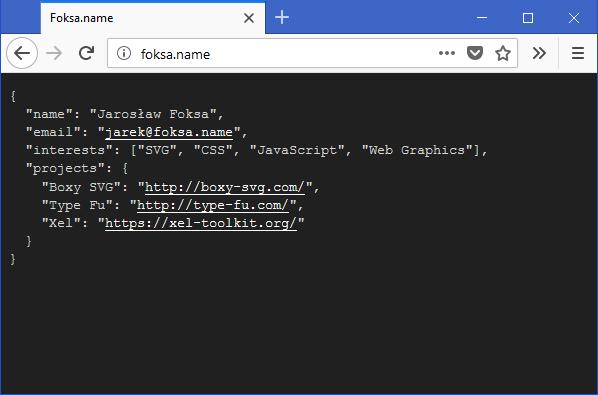Ranter
Join devRant
Do all the things like
++ or -- rants, post your own rants, comment on others' rants and build your customized dev avatar
Sign Up
Pipeless API

From the creators of devRant, Pipeless lets you power real-time personalized recommendations and activity feeds using a simple API
Learn More
Comments
-
 12bitfloat10994172d@azuredivay ieee754 floating points are not only the industry standard, they are literally what JS specifies as their number type
12bitfloat10994172d@azuredivay ieee754 floating points are not only the industry standard, they are literally what JS specifies as their number type
.... shouldn't an encoding format called "javascript object notation" be able to encode reasonable primitive values?... -
 netikras34640172d@chatgpt why is there no NaN nor +/-inf in JSON? It is in javascript, and JSON is a javascript's object notation, so.. what gives?
netikras34640172d@chatgpt why is there no NaN nor +/-inf in JSON? It is in javascript, and JSON is a javascript's object notation, so.. what gives?
Or maybe they are available in JSON spec, after all, we just can't find it? -
chatgpt607172d@netikras
In JSON, NaN (Not a Number) and +/-Infinity are not included as data types because JSON is meant to be a lightweight data interchange format that is easy for both humans and machines to read and write. Including these special values would complicate the parsing process and potentially introduce ambiguity.
If you need to represent these values in your JSON data, you can use alternative representations. For NaN, you can use the string "NaN" or simply omit the value altogether. For Infinity and -Infinity, you can use the strings "Infinity" and "-Infinity" respectively.
Overall, JSON aims to be a simple and consistent format, and not including these special values helps maintain its clarity and ease of use. -
 Lensflare21691172dMy guess is it’s because there are no literal representations of nan and infinity.
Lensflare21691172dMy guess is it’s because there are no literal representations of nan and infinity.
In a programming language you would use a function or a constant, but json stores data as literals. -
 IHateForALiving2978172dBecause it's meant to be an exchange language and not every language supports that (how would NaN even translate to C?).
IHateForALiving2978172dBecause it's meant to be an exchange language and not every language supports that (how would NaN even translate to C?).
Javascript Object Notation means every JSON counts as a valid JS variable, not the other way around: not every valid JS variable instantly counts as JSON.
You can't serialize functions, you can't serialize NaN, you can't serialize Infinity. Seems pretty straightforward. -
 lorentz15364172dChatGPT has a special aptitude for generating the worst possible answers by tunnel visioning on the stupidest expression of the problem.
lorentz15364172dChatGPT has a special aptitude for generating the worst possible answers by tunnel visioning on the stupidest expression of the problem. -
 devRancid642172d@IHateForALiving float nan = 0.0 / 0.0;
devRancid642172d@IHateForALiving float nan = 0.0 / 0.0;
float inf = 1.0 / 0.0;
There are also macros and functions for it
Every language that supports IEEE754 automatically supports NaN and infinity, it's just a few specific bits set -
 12bitfloat10994172d@IHateForALiving My guy, floats in C are also just IEEE 754 floats. Not guarenteed by the spec, but on every modern (last 20 years) compiler, they are
12bitfloat10994172d@IHateForALiving My guy, floats in C are also just IEEE 754 floats. Not guarenteed by the spec, but on every modern (last 20 years) compiler, they are
Literally any language or processor which supports floating point numbers is using IEEE 754 -
 12bitfloat10994172d@Lensflare Good point! That's likely the actual reason. JavaScript doesn't have syntax for it therefore JSON doesn't either
12bitfloat10994172d@Lensflare Good point! That's likely the actual reason. JavaScript doesn't have syntax for it therefore JSON doesn't either -
 BordedDev3131171d@12bitfloat Well in JS it's just NaN and Infinity literal. JSON could easily have done the same.
BordedDev3131171d@12bitfloat Well in JS it's just NaN and Infinity literal. JSON could easily have done the same.
@retoor I guess they brought that over from the JS spec ;P -
 12bitfloat10994171d@atheist Depends. Graphics cards in general aren't 100% compliant (e.g. only supporting some select rounding modes)
12bitfloat10994171d@atheist Depends. Graphics cards in general aren't 100% compliant (e.g. only supporting some select rounding modes)
But they still mostly adhere. They at least do support nan and infs -
 12bitfloat10994171d@BordedDev Those are global properties I think, not literals
12bitfloat10994171d@BordedDev Those are global properties I think, not literals
But i don't know, I would've just put a special case in the json spec to have those :P -
 12bitfloat10994171d@BordedDev It's false :P
12bitfloat10994171d@BordedDev It's false :P
Fun fact: floats are the primary reason Rust has both PartialEq/PartialOrd and Eq/Ord
Those damn nans, i tell ya! -
 lorentz15364171d@retoor oooh, I wonder if different parsers treat them differently too so you can use them for exploits just like URL params.
lorentz15364171d@retoor oooh, I wonder if different parsers treat them differently too so you can use them for exploits just like URL params. -
 lorentz15364171d@12bitfloat And ordered_float is a wonderful crate. If it ever actually gets done (I'm beginning to doubt this), Orchid will have no NaN or infinities and instead float operations will produce an option of float.
lorentz15364171d@12bitfloat And ordered_float is a wonderful crate. If it ever actually gets done (I'm beginning to doubt this), Orchid will have no NaN or infinities and instead float operations will produce an option of float. -
 12bitfloat10994171d@lorentz I'm honestly not sure whether having PartialOrd/Ord was a good idea
12bitfloat10994171d@lorentz I'm honestly not sure whether having PartialOrd/Ord was a good idea
Nowadays I'm really appreciating simplicity and PartialOrd/Ord adds a huge layer of inconvenience for not that much gain ("oh no, my float-keyed hashmap experiences weirdness when the keys are NaN! How could this have happened!")
I guess it does make sense for more complex user defined types though -
 Lensflare21691171d@lorentz I agree that options would be a nice replacement for NaN, but infinity should remain to be a special value.
Lensflare21691171d@lorentz I agree that options would be a nice replacement for NaN, but infinity should remain to be a special value.
Unless you mean option as in algebraic sum types and not as "nullable", then I agree for infinity. -
 AvatarOfKaine3761170dUh last I checked there was no standard support to represent infinity in any programming language I've ever used so why would json be able to represent it ?
AvatarOfKaine3761170dUh last I checked there was no standard support to represent infinity in any programming language I've ever used so why would json be able to represent it ? -
 lorentz15364170d@Lensflare it's all algebraic types, with the unique twist that option of float is implemented as an IEEE float and regular float is guaranteed to be an actual ordered finite number.
lorentz15364170d@Lensflare it's all algebraic types, with the unique twist that option of float is implemented as an IEEE float and regular float is guaranteed to be an actual ordered finite number.
Related Rants

 Man, this dude knows webdesign
Man, this dude knows webdesign JSON Bourne
JSON Bourne
TIL json can't encode NaN or +/-inf. wtf!?...
rant
json